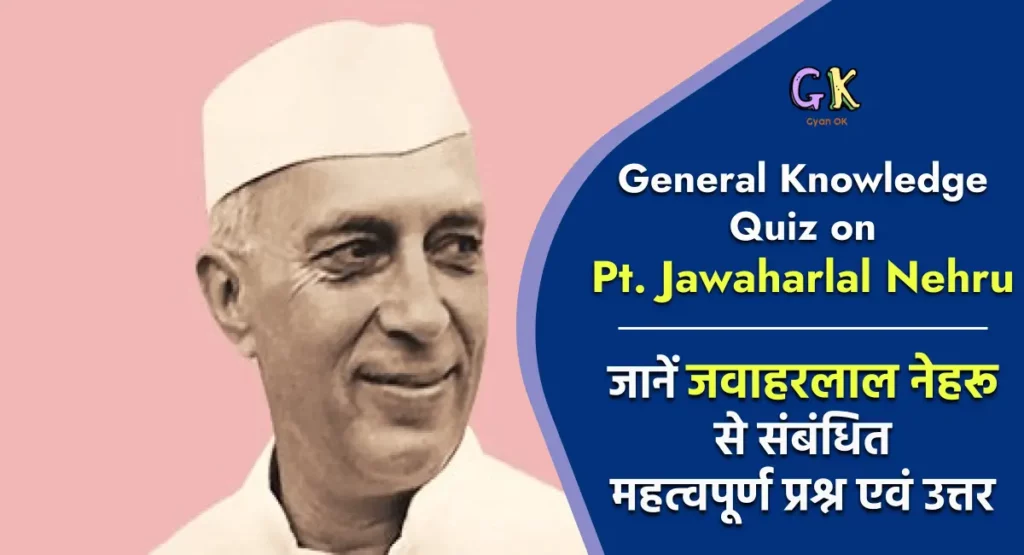Pt. Jawaharlal Nehru, a towering figure in Indian history, was India’s first Prime Minister and a key architect of the nation’s post-independence development. His charismatic leadership and vision for a democratic and socialist India left a profound impact. To honour his legacy and deepen our understanding of his contributions, we’ve crafted a quiz that explores the life and ideas of Pt. Jawaharlal Nehru. Join us in celebrating his remarkable journey through this enlightening quiz.

General Knowledge Quiz on Pt. Jawaharlal Nehru
Pt. Jawaharlal Nehru’s sharp intellect and statesmanship played a pivotal role in shaping modern India. As the first Prime Minister, his leadership laid the foundation for a democratic and secular nation. Nehru’s commitment to science and education, exemplified by institutions like the IITs and ISRO, propelled India towards progress and self-reliance. His dedication to world peace and non-alignment garnered international respect, solidifying his legacy in Indian history.
Following we have prepared a quiz dedicated to Pt. Jawaharlal Nehru for your self-assessment about how much information you know about him. The objective of this activity is self-assessment and help you learn something new through the process.
[–MCQ-QUESTIONS-DISPLAY–]
About Pt. Jawaharlal Nehru
Jawaharlal Nehru, often affectionately referred to as “Pandit Nehru,” was a towering figure in the Indian independence movement and the first Prime Minister of independent India. His life’s journey, marked by dedication to the nation’s freedom and socio-economic progress, has left an indelible mark on India’s history.
Born on November 14, 1889, in Allahabad, India, Nehru came from a family deeply rooted in Indian nationalism. His father, Motilal Nehru, was a prominent lawyer and leader in the Indian National Congress (INC), while his mother, Swaruprani Thussu, hailed from a family of Kashmiri Brahmins.
Nehru received his early education in India and later studied at Harrow and Cambridge University in England, where he developed a keen interest in politics, literature, and the arts. Upon returning to India, he briefly pursued a career in law but soon became engrossed in the burgeoning freedom struggle.
Nehru’s association with Mahatma Gandhi significantly shaped his political ideologies. He aligned himself with the non-violent civil disobedience movement led by Gandhi and actively participated in various protests and campaigns against British colonial rule. His articulate speeches and writings marked him as a rising leader within the INC.
In 1929, Jawaharlal Nehru became the President of the Lahore Session of the INC, during which the resolution for complete independence (Purna Swaraj) was adopted. His commitment to India’s full sovereignty and his advocacy for social justice became defining features of his political career.
Nehru was imprisoned multiple times for his involvement in the freedom struggle, including during the historic Dandi March led by Gandhi. His incarceration only strengthened his resolve and further endeared him to the Indian masses.
The year 1947 marked a significant turning point in India’s history. On August 15, 1947, India gained independence, and Jawaharlal Nehru was appointed as the country’s first Prime Minister by the INC. He assumed office with a vision for a modern, democratic, and secular India.
As Prime Minister, Nehru faced formidable challenges. He played a crucial role in shaping India’s foreign policy, emphasizing non-alignment during the Cold War, which allowed India to maintain its sovereignty while engaging with both Western and Eastern blocs. His vision of the Non-Aligned Movement (NAM) laid the foundation for a powerful global voice of developing nations.
Domestically, Nehru’s government embarked on ambitious plans for socio-economic development. His Five-Year Plans emphasized industrialization, agricultural reforms, and the expansion of educational and scientific institutions. Iconic projects like the Bhakra-Nangal Dam and the establishment of the Indian Institutes of Technology (IITs) symbolized his commitment to nation-building.
Nehru’s tenure was also marked by the successful integration of princely states into the Indian Union, a task achieved through diplomacy and political acumen. He was a staunch advocate for secularism and social justice, emphasizing the importance of inclusive policies and equality for all citizens.
Despite his many achievements, Nehru faced challenges, including border disputes with China and economic setbacks. His death on May 27, 1964, left a void in Indian politics and marked the end of an era.





